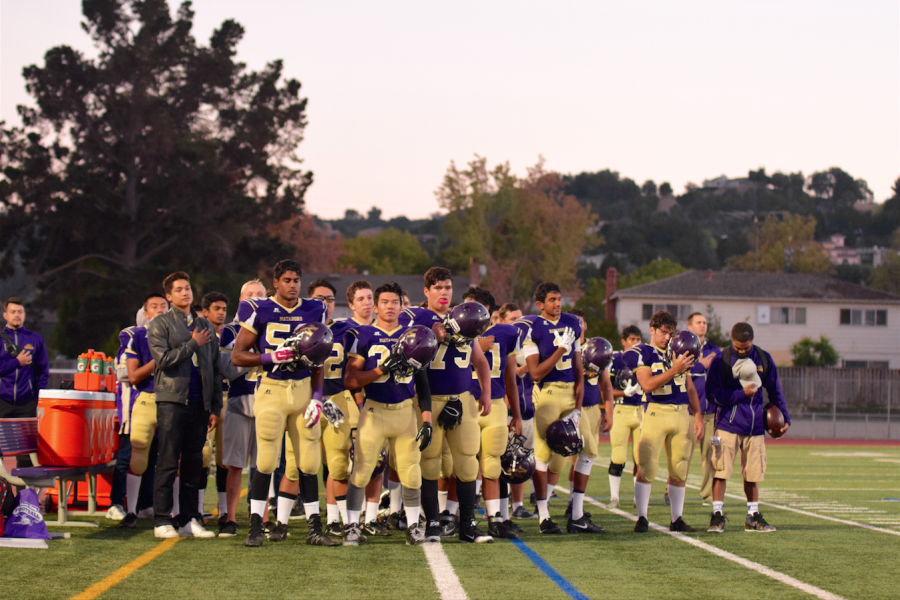rior to sporting events, as the Star Spangled Banner plays in the background, athletes stand with their hands over their hearts, looking towards the flag. But as of late, more and more athletes of all levels have begun kneeling or sitting during the national anthem. The method of protest that started with San Francisco 49ers quarterback Colin Kaepernick’s protest of African American violence has caught a lot traction. In numerous press conferences, Kaepernick has stated that he will continue to kneel during the national anthem until significant changes have been made to ease violence against African Americans. However, kneeling during the national anthem, especially in front of thousands of raging fans in the stadium and another million or so viewers at home, is not a simple undertaking.
In a survey conducted of 389 MVHS students, 83 percent of students supported Kaepernick’s right to kneel, but had varying ideas on its efficacy. Although students at MVHS generally seem to support Kaepernick’s actions, Kapernick’s protest has created some very polar opinions in the rest of the public: some support his First Amendment right to protest, but others find that his actions cross the line because they are disrespectful to the nation.
It’s valid to argue that Kaepernick is exercising his freedom of protest, as guaranteed to him by the Bill of Rights. It’s also valid to argue that though Kaepernick is allowed to protest, his means of expressing his displeasure is not the most effective or respectful. But the line is drawn when the argument shifts from criticism of the First Amendment or national respect to a criticism of Kaepernick’s upbringing in a stable white household. Some argue that given Kaepernick’s upbringing in a stable white household, he does not have the experiences under his belt to justify his controversial protest. Kaepernick is biracial; his biological parents were an African American man and a caucasian woman. However, Kaepernick was adopted and raised by his parents, Rick and Teresa Kaepernick, who both happen to be caucasian.
“I tell you this, I’m a black man. And Colin Kaepernick — he’s not black,” ex-NFL player and current analyst Rodney Harrison said in an interview with a Houston radio station. “He cannot understand what I face and what other young black men and black people face, or people of color face, on a every single [day] basis.”
Harrison was later informed that Kaepernick was actually biracial by birth, at which point he responded on Twitter with an apology.
Last point I want people to know. I never even knew he was mixed.
— Rodney Harrison (@Rodney_Harrison) August 30, 2016
I should not have called Colin Kaepernick’s race into question during this morning’s radio interview. It was a mistake and I apologize.
— Rodney Harrison (@Rodney_Harrison) August 30, 2016
However, as Harrison later admitted, race should never have even come into question.
Being a member of the African American community, and having to face what they have to, is not a qualification for being able to campaign for black rights. Kaepernick identifies as an American, and while issues like violence towards minorities persist in the forefront of American culture, he is entitled to take a stance on them. Whether he is black, white, biracial, Asian, Mexican or belongs to any other race, he has the right to speak out against what he perceives as injustice. Same as how there are men that advocate for equal wages by gender, or heterosexual people who can advocate for the LGBTQ+ community. Being a member of any minority community should not be a prerequisite for advocating for said community. As an outsider to a community, one can not pretend to even understand the discrimination a minority may face. But their lack of experience does not cloud their judgements on morality; race and background do not prevent them from understanding right from wrong.
Others argue that if members outside of an affected community start advocating for minority rights, it ultimately removes control from a minority. Yet, protest or advocacy ultimately empowers the minority. Additionally, this is not to say that minority members cannot join in on the advocacy. Ultimately, people should be able to stand up for the ideas that they believe in, regardless of whether or not they have explicit affiliation with those affected.
Kaepernick is justified in his actions when protesting violence against African Americans; just ask President Obama, who has stated that it is a right guaranteed to Kaepernick by the First Amendment. Kaepernick’s means of protesting may be controversial, but the intention behind his protest is sound; he wants to change a facet of American society that he finds unpleasing or unfair. He, like any other individual, has a right to stand up, or kneel down, for what he believes in.








